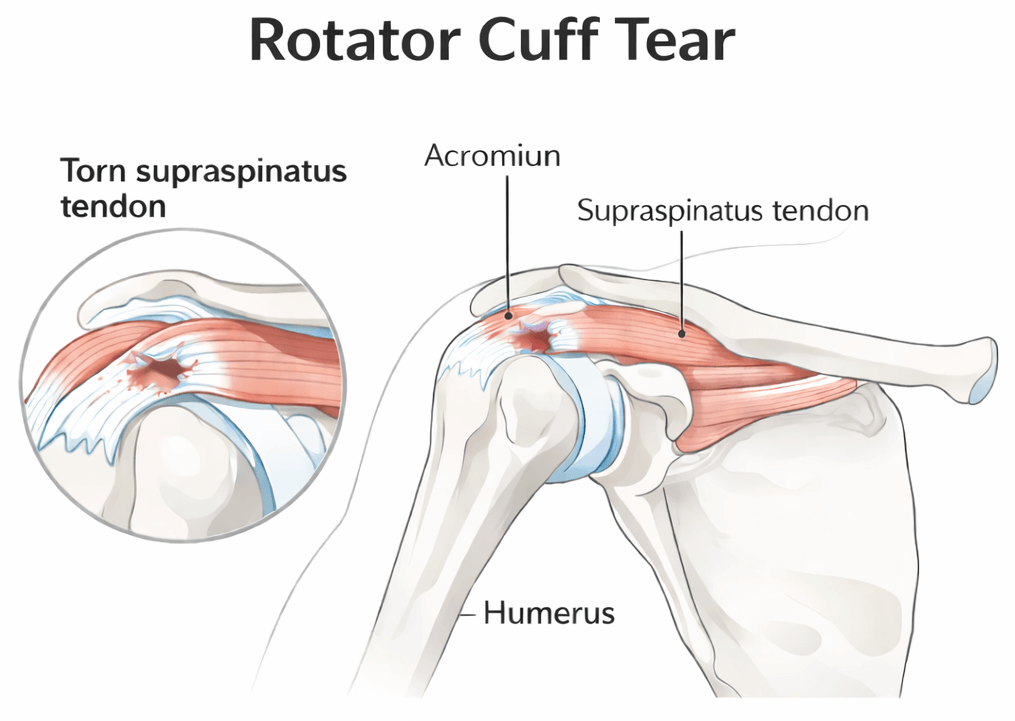
Rotator Cuff Tear Treatment
Should you have rotator cuff surgery for your torn rotator cuff tendon or is rotator cuff tear treatment with a physio more effective?
This is a tricky question and the topic of the treatment and management of rotator cuff tears in Perth remains controversial.
Here at Perth Shoulder Physio, we’re the only physiotherapy clinic in Perth to focus specifically on the shoulder, making us experts in this area of the body. We have your best interests at heart and will help you answer this controversial question, with the rotator cuff tear treatment strategy that’s best suited to you.
Note: This page contains general information on rotator cuff tear treatment in Perth. Book an appointment with Perth Shoulder Physio for more specific information about your shoulder injury and the optimal rotator cuff tear treatment for you.
What is a Rotator Cuff Tear?

To understand a rotator cuff tear, you must first understand the anatomy and function of the rotator cuff muscles and tendons.
The rotator cuff muscles are a group of four individual muscles that originate on the shoulder blade and attach to the upper arm bone.
The rotator cuff muscles are:
- Supraspinatus – originates from the top of the shoulder blade and runs over the top of the ball and socket joint of the shoulder
- Subscapularis – originates from the front of the shoulder blade and runs across the front of the ball and socket joint of the shoulder
- Infraspinatus and Teres Minor – originate from the back of the shoulder blade and run across the back of the ball and socket joint of the shoulder
The rotator cuff muscles are distinct and separate muscles, as you will see in most textbooks and anatomy models. However, as they approach the arm they blend into a continuous ‘blanket like’ rotator cuff tendon that wraps around the ball and socket joint of the shoulder. This allows the muscles to function as a unit and provide valuable assistance for each other in the case of a small rotator cuff tear.
The rotator cuff muscles have two roles;
- to rotate the upper arm
- to stabilize the ball in the socket when the arm is moved
The term rotator cuff tear actually alludes to a torn rotator cuff tendon, rather than a tear in the muscle. Rotator cuff tears are graded as a partial thickness rotator cuff tear or a full thickness rotator cuff tear. A supraspinatus tear is the most common rotator cuff tear followed by infraspinatus tears and subscapularis tears.
What are the causes?
There are two main types of rotator cuff tears and their causes are different.
Let’s take a look:
Traumatic Rotator Cuff Tears
- A fall on an outstretched arm, especially in those over the age of 40.
- Unexpected or excessive force applied to the shoulder such as weight lifting.
- Sudden traction or pulling on the arm. For example, taking the weight of a heavy piece of furniture when the person assisting you lets go.
Non-Traumatic Rotator Cuff Tears
- Aging and disuse can lead to degenerative rotator cuff tendinopathy and eventually rotator cuff tears.
- A degenerative rotator cuff tendon is more likely to tear when subjected to excessive force or trauma.
What are the symptoms of a rotator cuff tear?
- Shoulder pain and weakness when the arm is elevated, especially under load such as reaching up to place something heavy in an overhead cabinet.
- Pain when lying on the affected shoulder at night.
- Possible clicking or crunching when the arm is elevated.
- There is typically minimal pain at rest unless the rotator cuff tear is acute.
How is a Rotator Cuff Tear Treated?
This section includes general advice on rotator cuff tear treatment that may benefit you.
It’s important to recognise that no two rotator cuff tears are equal. So, rotator cuff tear management that worked for a friend may not work for you.
At Perth Shoulder Physio, we have the knowledge and experience to assess your shoulder injury and implement a rotator cuff tear treatment plan for your individual circumstances.
Physiotherapy Treatment for your rotator cuff tear includes a range of options depending on the severity of your condition.
Physiotherapy Treatment for Rotator Cuff Tears
- Massage, dry needling and other manual therapy for rotator cuff tear pain relief
- Advice and education on modifying activities to reduce stress on the torn tendon
- Very specific and graduated rotator cuff strengthening exercises
Rotator cuff exercises are an essential component of rotator cuff tear management.
Depending on your individual circumstances and the size and location of your rotator cuff tear, you may require a combination of shoulder mobility, rotator cuff strengthening or scapula strengthening exercises.
Surgery for Rotator Cuff Tears
Perth Shoulder Physio will recommend the very best shoulder specialists if rotator cuff surgery is required
Post Operative Rehabilitation following Rotator Cuff Surgery
Adam has collaborated with leading shoulder surgeons to produce a comprehensive rotator cuff treatment and rehabilitation program following rotator cuff surgery.
This includes:
- Mobility exercises of the neck, shoulder blade, elbow and wrist whilst wearing a sling
- Pain relieving shoulder exercises
- Graduated mobility exercises for the shoulder
- Graduated strengthening exercises for the shoulder
Relieve your shoulder pain
Is it time to relieve the pain in your rotator cuff?
Are you ready to feel better again and move more freely?
Book your treatment today for a personalised treatment plan, to get you on your way to some much-needed pain relief and back to doing all the things you love.
